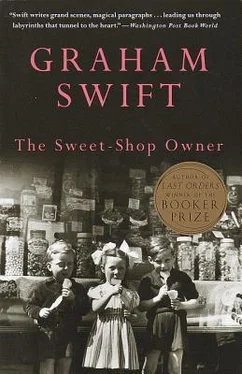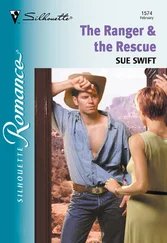Graham Swift - The Sweet-Shop Owner
Здесь есть возможность читать онлайн «Graham Swift - The Sweet-Shop Owner» весь текст электронной книги совершенно бесплатно (целиком полную версию без сокращений). В некоторых случаях можно слушать аудио, скачать через торрент в формате fb2 и присутствует краткое содержание. Год выпуска: 2012, Издательство: Vintage Books USA, Жанр: Современная проза, на английском языке. Описание произведения, (предисловие) а так же отзывы посетителей доступны на портале библиотеки ЛибКат.
- Название:The Sweet-Shop Owner
- Автор:
- Издательство:Vintage Books USA
- Жанр:
- Год:2012
- ISBN:нет данных
- Рейтинг книги:4 / 5. Голосов: 1
-
Избранное:Добавить в избранное
- Отзывы:
-
Ваша оценка:
- 80
- 1
- 2
- 3
- 4
- 5
The Sweet-Shop Owner: краткое содержание, описание и аннотация
Предлагаем к чтению аннотацию, описание, краткое содержание или предисловие (зависит от того, что написал сам автор книги «The Sweet-Shop Owner»). Если вы не нашли необходимую информацию о книге — напишите в комментариях, мы постараемся отыскать её.
The Sweet-Shop Owner — читать онлайн бесплатно полную книгу (весь текст) целиком
Ниже представлен текст книги, разбитый по страницам. Система сохранения места последней прочитанной страницы, позволяет с удобством читать онлайн бесплатно книгу «The Sweet-Shop Owner», без необходимости каждый раз заново искать на чём Вы остановились. Поставьте закладку, и сможете в любой момент перейти на страницу, на которой закончили чтение.
Интервал:
Закладка:
New life. How the past shifted into the background that day, and how the present seemed sharp and clear. New life: held in my hands. ‘Don’t let her catch cold,’ said Aunt Mad. But you were warm, warm to touch, and I held you close in your white shawl while Irene adjusted her hat and straightened the flower in her button-hole. She held a hand over her eyes against the glare of the wet road and frowned. Then I gave you back to her. The car was waiting at the kerb, glistening with drops. We strode over the gravel. Helen was sitting already in Hancock’s new Sunbeam, holding up the mirror of her powder compact to her face, while Hancock stood by the driver’s door. The rest of us were passing through the gateway when he reached inside, produced a camera and said: ‘Hold it there! Out you get, Helen.’ And Helen got out, dabbing her cheeks. Later you saw the picture, in the old album: Uncle Smithy, Auntie Grace, Auntie Mad, Mrs Hancock (though she wasn’t Mrs Hancock then), I, with my trousers flapping, and she holding you with that look (yes, you noticed it, sitting with the album on your knees) as if someone had passed you to her and she didn’t know where to put you.
‘Hold it,’ said Hancock. He grinned as the camera clicked.
Sweet sherry, christening cake, tea in the best cups; little bridge rolls with spreads and sprigs of cress on white doilies on the cake stand … ‘Thank you so much Mrs Chapman.’ Helen’s glassy voice tinkled in the hallway by the barometer clock. ‘Lovely party. And I’m so glad’ — she paused, as if to lay some special emphasis — ‘to have had the chance to meet you.’ There was a crumb of christening cake in the corner of her lips and her face was flushed from the sherry. ‘Bye Mr Chapman.’ Hancock hovered in the doorway and, behind him, the other guests to whom he was offering lifts. ‘Bye!’ How grotesque they looked, bobbing on the doorstep. How awkward Smithy seemed, in his best coat and his Homburg (he worked hard at his social graces), out of his crumpled barber’s jacket. But you had no pretensions, you were wholly yourself, and you didn’t struggle or cry (you’ll never remember it) as they passed you round from one to the other, rocked you and dandled you. ‘What a lovely thing,’ said Helen longingly. ‘Isn’t she gorgeous?’, turning to Hancock; while Auntie Mad cornered Smithy and whispered, ‘Tell me, did you know William before he, er, met Irene?’; and Smithy’s sister sipped her sherry delicately; and Helen, patting her hair, giving quick glances to Hancock, kept letting her eyes drift over the laden sideboard, the silver, the Derby and Worcester in the china cabinet: ‘I’ll come and see you Mr Chapman — if I may — in your shop’; ‘And tell me,’ said Aunt Mad, ‘What do you do?’ ‘Oh — modelling actually — er, photographic work. But I’ll stop when me and Frank …’; and the cake was cut — white icing with pink scrolls — and handed round on the white and blue patterned plates; and Aunt Mad said to Hancock, ‘Well, and how’s business, Frank?’: Hancock said, ‘Can’t go wrong, property market’s got to expand’: and Aunt Mad began again, ‘Pity Paul isn’t here’; and Smithy said, at last, helping me with some things to the kitchen, ‘We’d best be off, old pal — Irene’s looking, er, rather tired.’ ‘You look after that baby now.’ He winked. Though it wasn’t clear from his voice which baby he meant.
‘What nonsense,’ she said as the door shut. ‘What a performance! Thank God they’ve gone.’ Her breath heaved. ‘Take the baby, will you?’ She held her forehead as I took you from her. ‘Can you put her to bed? I’m going to get one of my migraines.’ And she sat in the chair by the french window, leaning forward, her head in her hands, breathing heavily, fingers tightening over her brow, but resolutely, uncomplainingly, as if she’d long been prepared to suffer like that.
It was only when I held you out so that she could say goodnight and as she lifted her face you started to cry, that she winced, as if it were you who made her feel her pains.
‘Ssshh. Don’t cry. Mummy’s got a headache.’
I whisked you upstairs, soothed you (‘There, be quiet for Mummy’), undressed you, bathed you, laid you in your cot, waited till your eyes closed, while she sat below.
When I came down her head was still in her hands.
‘Is she asleep?’
‘Yes.’
‘Good.’ She looked through her fingers. ‘Now I’ll go up and lie down.’ She got up, gingerly, from the armchair. ‘I’m sorry Willy. You’ve been good. Thank you.’ She put her hand on my shoulder. But it wasn’t a leaning for support so much as a gesture of command.
‘All right. I’ll be up later.’
And still the things needed clearing from the table — the plates, the tea service, the glasses, the remnants of the christening cake, the damask table-cloth.
You thought I slaved for her, didn’t you, Dorry, ran to her beck and call?
I carried the piled-up tray into the kitchen. Washed and dried. Brushed the crumbs from the chairs. Put away the silver. New life. Your eyes were hers (they all agreed) and the nose; only something in the mouth was mine. ‘Dorothy’: we called you ‘Dorothy’. There it was in the church register, on the iced cake, on the silver napkin ring Aunt Madeleine gave you. But it was only years later that you yourself, coming home from school (how quick you were to learn things) explained what it meant. Dorothea: God’s gift.
‘Like it wrapped?’ Mrs Cooper took down the large box of chocolates for the customer and busied herself (a speciality of hers) with the fancy string and the shiny paper.
‘Present is it, for someone?’
She looked aloofly at Sandra wiping ice-cream off her skirt.
’50, ’51, ’52. How quickly the years pass when you watch the growth of your child. Fourteen years since I first opened the shop and fixed my name, hazardously, over the door; twelve years since the war closed it. Its place was established now. Grey-overcoated City workers on their way to the station spoke of ‘popping into Chapman’s’, and no one remembered the name of the previous owner. And along the façade of the High Street it was other changes that bore witness to novelty. Across the road the ironmonger’s had gone and the home decorators (Hobbes’ Home Supplies) had moved in. Determined young couples, wheeling prams, would frequent it on Saturday mornings, earnestly choosing linoleum and paint and emerging with rolls of wallpaper (muted shades, tiny raised fleurs-de-lis on pale grounds and heavy braided strips for below the picture rail). Beyond the post-office, the electrical shop was stocking televisions, heavy and wooden, ready to bring a Coronation into living-rooms. The bomb-site had been cleared in Briar Street; and behind the Prince William, where the brewers had sold the little walled beer-garden, they were levelling the ground for a garage and a showroom. For petrol rationing had ended and the private car, they said, would boom.
A café had opened next to the baker’s. It was the Tudor then — high-backed chairs, gingham table-cloths — and it would become the Calypso Espresso Bar before it became the simple Diana. And, two shops along, behind the wooden partitions of their office, sat Hancock and Joyce. The Sunbeam was parked outside, and now and then, in dry weather, Hancock would pull back the hood and drive up in the leather flying jacket he’d procured from his Air Force days. ‘Well didn’t you nab anything,’ he’d explain, ‘working in the stores?’ They’d tried to run that business, he and Joyce, with the panache of young bachelors, relying for dignity and esteem on the memory of old Jones. But now they’d have no need to prove their probity, for the houses would begin to be built (hadn’t he said to Aunt Madeleine, munching his piece of christening cake, ‘Can’t lose, selling houses after a war’?); the market would revive, the little ‘For Sale’ notices would be exchanged ever more rapidly in the window. He was married too (we never went to the wedding because of Irene’s asthma), with a house in Sydenham Hill. The blonde Helen would sit, while Hancock worked, in wifely ease, thumbing the fashion pages and the catalogues, listing the furniture, the carpets, the kitchen appliances she would need to have. Did she know how long all that would suffice her? ’53, ’54. See, the ration books are being withdrawn. Prices have risen, but we are free to spend. And Hancock, coming in with that quick glance round and that competitive twinkle in his eye, said, ‘Not doing so badly yourself, are you? Shall we make it cigars?’
Читать дальшеИнтервал:
Закладка:
Похожие книги на «The Sweet-Shop Owner»
Представляем Вашему вниманию похожие книги на «The Sweet-Shop Owner» списком для выбора. Мы отобрали схожую по названию и смыслу литературу в надежде предоставить читателям больше вариантов отыскать новые, интересные, ещё непрочитанные произведения.
Обсуждение, отзывы о книге «The Sweet-Shop Owner» и просто собственные мнения читателей. Оставьте ваши комментарии, напишите, что Вы думаете о произведении, его смысле или главных героях. Укажите что конкретно понравилось, а что нет, и почему Вы так считаете.












